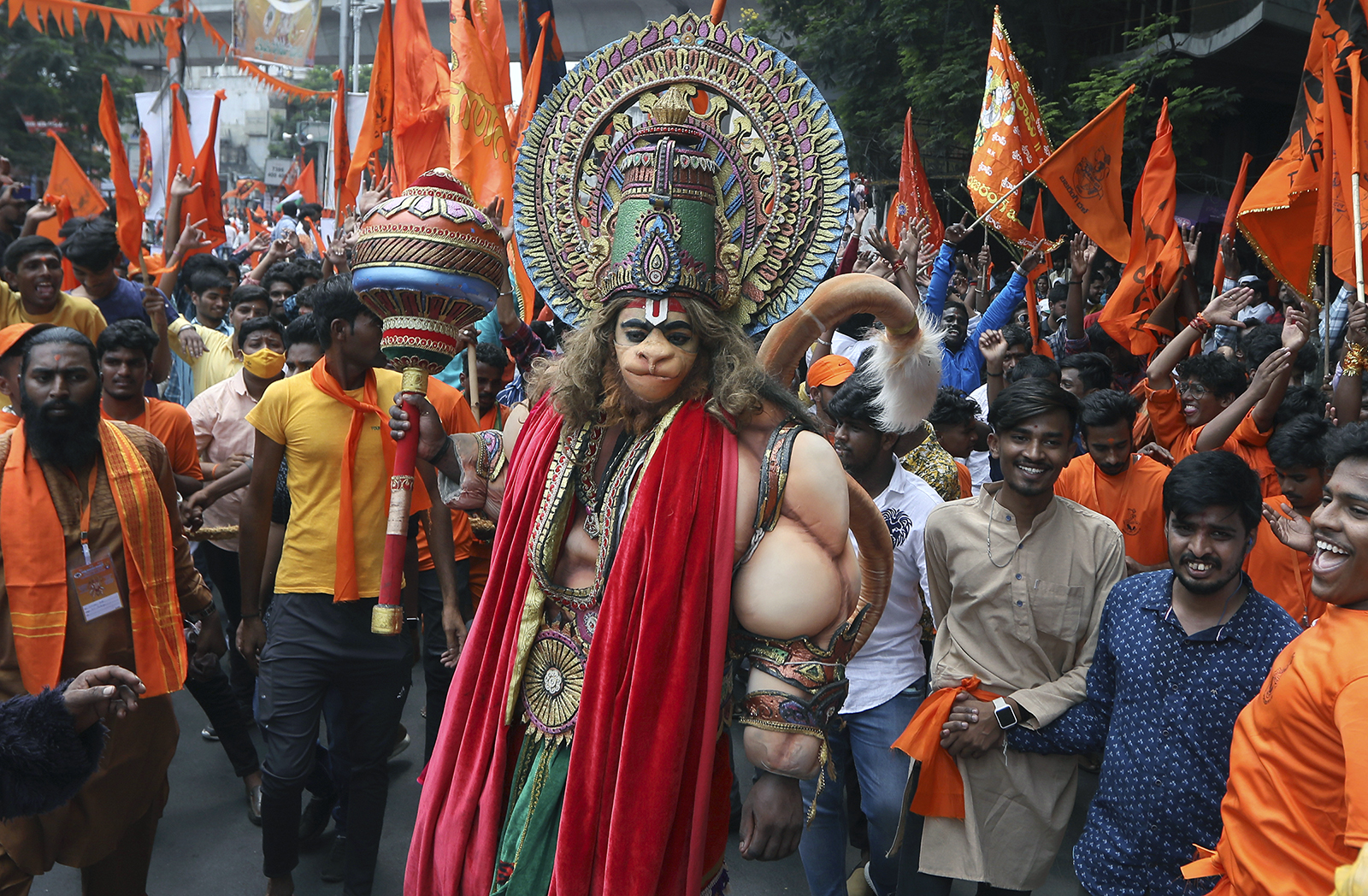(RNS) — The new movie “Monkey Man,” which premiered earlier this month at the South by Southwest festival, will appeal to most viewers as a revenge action thriller and, of course, to fans of British actor Dev Patel, who also directed the movie in his feature directing debut.
But “Monkey Man” is also the latest and most prominent introduction to American audiences of Hanuman, the Hindu deity in monkey form who has already seen cameos in the 2018 blockbuster “Black Panther” and its sequel “Wakanda Forever,” as well as Pixar’s Oscar-nominated short, “Sanjay’s Super Team.”
Patel, a Hindu whose breakthrough role came in 2008’s “Slumdog Millionaire,” wanted his movie — which was co-produced by Jordan Peele — to highlight India’s social inequalities. But he admits that he’s fascinated by Hanuman’s superhero mystique.
“What baffled me growing up was this iconography of this super-strong being who could hold mountains in one hand and split his chest open,” Patel told an audience after the screening at SXSW. “It reminded me of the iconography of Superman. I was, like, this is amazing, I wish the world knew about it.”
Patel said he was also attracted to Hanuman’s qualities of devotion, loyalty, valor and strength embodied in Kid, whose story the film tells. But the movie also shows how even Hanuman has moments of weakness in his journey. “When you go deep into it, he is sort of a guy who has lost faith in himself and had to be reminded of who he was,” Patel said.

Actor Dev Patel in “Monkey Man.” (Photo © Universal Studios)
Hanuman’s prominence in the film also demonstrates the long, sometimes painful, evolution of Hinduism’s depiction in popular media, which has fictionalized and distorted the faith in “Indiana Jones and the Temple of Doom” and, most famously perhaps, in “The Simpsons,” whose character of Apu was a stereotype so unvarnished that he became the subject of a yearslong controversy and a documentary about discrimination against Hindus and people of South Asian descent.
Americans’ dismissal of Hinduism extends back to the media’s earliest coverage of the faith at the turn of the 20th century. “Hindoo Fakir,” Thomas Edison’s filming of an Indian magician’s act from 1902, and “Sucker Monkey” (1916), among others, depicted Hindus as superstitious, untrustworthy and fraudulent, while books such as Katherine Mayo’s “Mother India,” published in 1927, depicted Hindus as savages who were unable to rise to the “standards” of Christian civilization.
When Hindu beliefs have been presented positively, they are often de-Hindu-ized. As Philip Goldberg and Jeffery Long have argued, the Star Wars franchise, “The Matrix” and other movies were based on Hindu concepts yet left most fans of the films in the dark about the connection.
“Monkey Man” represents an extraordinary shift away from this past century and more toward American filmmakers and writers presenting Hinduism as exotic, strange and pernicious.
It’s not surprising that it took Hindu creatives to effect the change. Mindy Kaling’s Netflix series “Never Have I Ever” and Sanjay Patel’s “Sanjay’s Super Team” have shown the personal relationships many Hindu Americans have with deities, while credible Hindu characters have become more common on television and in the movies.

A man dressed as Hanuman walks in a religious procession to mark Hanuman Jayanti, a festival celebrating the birth of the monkey-god Hanuman, in Hyderabad, India, April 16, 2022. Hanuman is one of the most popular gods in the crowded pantheon of Hindu deities, and devout Hindus ascribe great strength and valor to him. (AP Photo/Mahesh Kumar A.)
In the second-season premiere of the CBS show “Ghosts,” the lead character, Jay (played by my friend Utkarsh Ambudkar), explains how, as a Hindu, he believes in reincarnation, a central tenet of Hindu theology. The 2023 supernatural horror film “It Lives Inside” is based on Hindu ideas, according to the film’s director, Bishal Dutta, who said it serves as “a love letter to the community and culture that raised me.”
While Hindus like me would love to see “Monkey Man” become a box-office hit, that goal is secondary to how the film furthers the mainstreaming of Hinduism. Its very existence is another positive step as Hinduism and its 2 million-plus adherents in the United States continue to become more integrated into America’s social fabric. If we wish him a big opening weekend, it’s only because it will allow “Monkey Man” to create more positive sentiments about our religion and increase the cultural self-assuredness of younger Hindu Americans.

Murali Balaji. (Photo courtesy University of Pennsylvania)
(Murali Balaji is a journalist and a lecturer at the Annenberg School for Communication at the University of Pennsylvania. The views expressed in this commentary do not necessarily reflect those of Religion News Service.)





